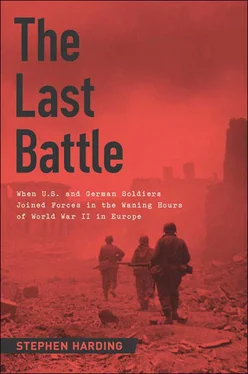Indeed, so effective were Jouhaux’s tactics at the match factory that he soon came to the attention of national labor leaders. He was invited to join the executive committee of the CGT in 1906 and was soon working full-time on issues important to workers throughout France. Though he continued to be known as a tough negotiator, he also developed a healthy pragmatism that allowed him to compromise when it helped to ultimately advance the cause of the CGT and its members. Following several early successes, in 1909 he was named the CGT’s secretary-general, a promotion that made him, at just thirty years old, arguably the most powerful labor leader in France.
Among the most pressing problems Jouhaux faced in his first years as head of the CGT was the rising tide of militarism in Europe. Believing that wars made workers suffer solely to further enrich their capitalist bosses, Jouhaux joined with other European labor leaders to endorse disarmament and universal antimilitarism. Yet when Europe descended into war in 1914—despite what Jouhaux later called the labor leaders’ “best efforts to build a dike against the onrushing sea of blood” [75] 28. Ibid.
—union members in each warring nation rallied to the colors and enlisted in droves. The reality of war changed even Jouhaux’s mind: he quickly came to see that a German victory could very well lead to the virtual enslavement of French workers, and thereafter he worked diligently to support the French war effort.
Despite that support, Jouhaux never lost the belief that the working people of the world could ultimately help make war obsolete if they banded together in an international trade-union movement, and he worked diligently to make such an alliance a reality. He was a major player in the post–World War I reconstitution of the International Federation of Trade Unions (IFTU) and in 1919 became the organization’s vice president even while maintaining his role as head of the CGT. Throughout the 1920s and 1930s he tirelessly exerted his considerable influence to bring together Europe’s disparate labor organizations. In November 1937 Jouhaux was one of three IFTU leaders who traveled to Moscow for talks regarding the affiliation of Soviet Russia’s Central Council of Trade Unions with the IFTU. Despite being a staunch anticommunist, Jouhaux maintained that such an affiliation was logical as a reaction to the growing power of fascism in both Germany and Italy, but his recommendation that the IFTU establish close and pragmatic ties with the Soviet organization was rejected by the full board of the IFTU. [76] 29. Van Goethem, The Amsterdam International , 100.
Jouhaux’s efforts to help avert another world war were ultimately in vain, of course. Following France’s June 1940 capitulation, Vichy ordered the CGT dissolved, prompting many of its members to form a nascent resistance movement. Jouhaux’s outspoken criticism of the Pétain regime ensured that his name soon ended up on an arrest list, and a warrant was issued for him in October 1940. He’d already gone underground, however, traveling within unoccupied France on false papers that identified him as a Czech named Bedrich Woves. [77] 30. Ibid., 260.
He was referred to as “Mr. Buvot” by the compatriots who helped him move from one safe house to another but signed his own name to the many pamphlets he wrote, urging all true trade unionists to support the Allied cause and pleading for unity among France’s fractious left-wing groups. To pass his writings on to those who would reproduce and distribute them, Jouhaux relied on his secretary and longtime companion (and future wife), Augusta Bruchlen, [78] 31. Various writers have rendered her last name in different forms—including Brücklin, Broukhlin, and Brucklen—usually depending on the language in which they were writing. Since she and Jouhaux most often used Bruchlen, I have chosen to use that spelling in this volume.
an Alsace-born Frenchwoman whose fluency in German several times helped her escape detection as she was attempting to contact members of the resistance movement that had grown out of the now-banned CGT.
In January 1940 the IFTU’s London-based executive committee decided that all of the major labor leaders in continental Europe should be evacuated to Britain, and Jouhaux was the first on their list. The organization initially approached the British Secret Intelligence Service (SIS), [79] 32. The agency charged with conducting intelligence-gathering operations outside the United Kingdom, often referred to as MI6.
which favored the IFTU’s plan but was ultimately unable to put it into operation. Following Britain’s July 1940 creation of the Special Operations Executive (SOE)—a quasi-military organization specifically tasked with undertaking clandestine activities in enemy-occupied territories—the IFTU approached its political head, Minister of Economic Warfare Hugh Dalton. A longtime socialist, Dalton wholeheartedly agreed that Jouhaux would be far more valuable to the Allied cause working in London than he would be rotting in a Vichy or German prison. [80] 33. Mackenzie, The Secret History of SOE , 269.
Dalton therefore used his considerable influence to ensure that Jouhaux’s escape from France became a top SOE priority.
By early November 1941 SOE had arranged for the labor leader to be smuggled out of France into neutral Portugal, where he was to board a flight for Britain. A double agent within the CGT resistance apparently got wind of the attempted escape, however, and betrayed the plan to the Vichy secret police. Jouhaux was arrested at the port of Marseilles on November 26, [81] 34. There is some confusion in the historical record about the exact date of Jouhaux’s arrest, with some sources mentioning Nov. 12. However, since Jouhaux’s secretary and eventual wife, Augusta, believes it was Nov. 26, I have chosen to use that date.
1941, just as he was about to take ship—using his false papers—for Portugal.
After his arrest Jouhaux was driven to Vals-les-Bains, a small spa town nestled in the Rhône-Alpes, where he was held incommunicado as his Vichy captors pondered what to do with him. At the end of January 1942 he was moved to Cahors, a quaint medieval town some ninety miles northwest of Vals-les-Bains, where he lived under house arrest until the beginning of November. He was then moved yet again, this time to the spa town of Évaux-les-Bains in central France, in which the Vichy regime had established a centralized internment center for top-level political prisoners. The accommodations were relatively civilized—the captives were housed in the town’s former Grand Hotel—and about a month after his arrival Jouhaux was permitted a visit from Augusta Bruchlen. In January 1943 she herself was arrested by the Sûreté, apparently because of her work as a courier between Jouhaux and the CGT resistance. Eventually interned in the same Grand Hotel, she was apparently no longer considered a major threat, because her captors allowed her twice-weekly visits with Jouhaux, albeit in the presence of a policeman. [82] 35. Léon-Jouhaux, Prison pour hommes d’Etat , 11.
These occasions did much to cheer the labor leader, who had for several months been suffering from a prolonged arthritis flare-up and increasingly severe angina.
Jouhaux’s idyll in Évaux-les-Bains ended abruptly on the night of March 31, 1943. A squad of German soldiers hustled him from his room with little more than the clothes on his back, handcuffed him, and shoved him into the back of a waiting military ambulance. With a German guard sitting on either side of him, he was driven to the airport in Clermont-Ferrand, where he joined Daladier and Gamelin for the journey to Buchenwald and, ultimately, Schloss Itter.
Читать дальше












